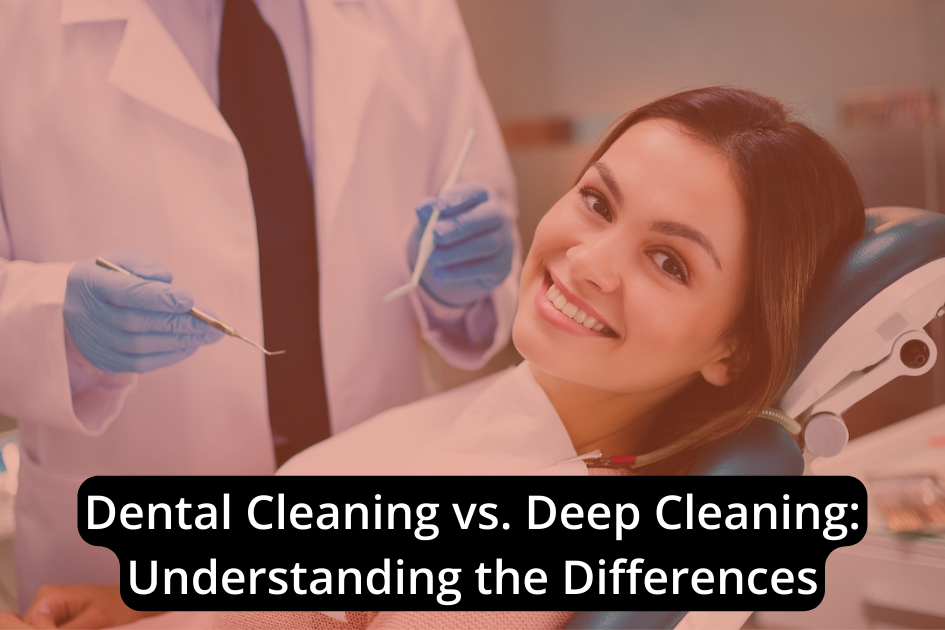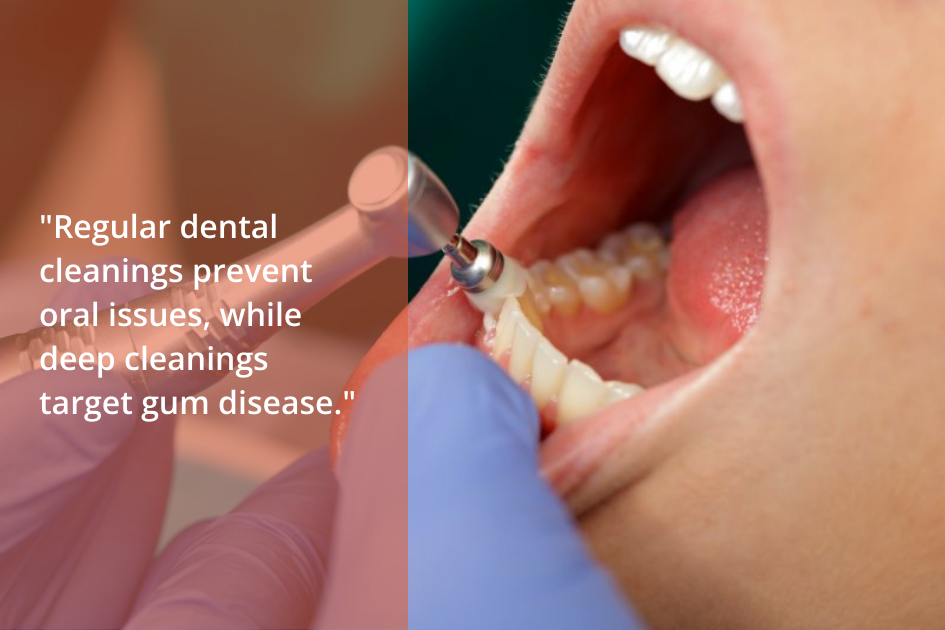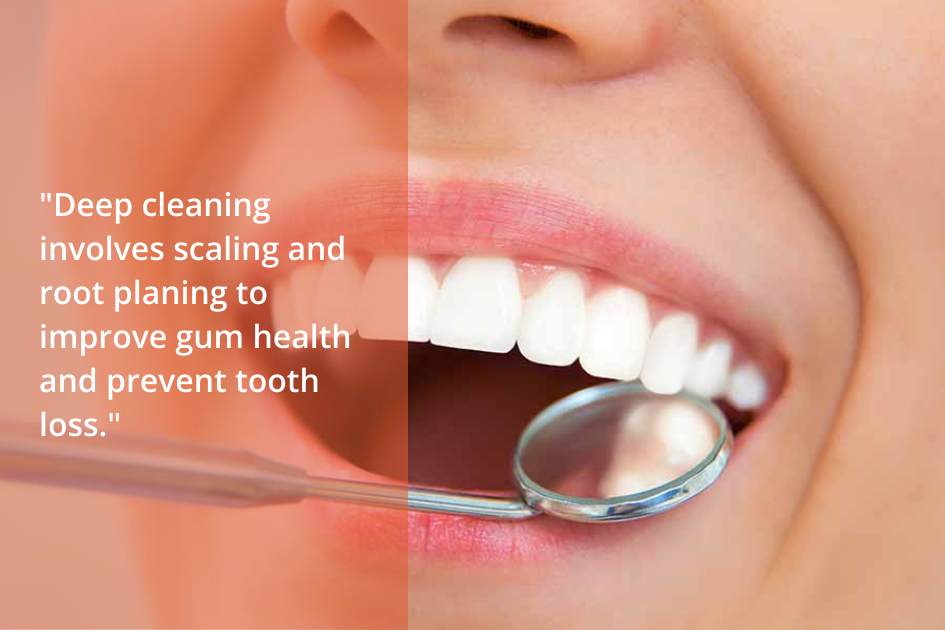Regular dental cleanings focus on preventing oral issues by removing plaque and tartar build-up on tooth surfaces, whereas deep cleanings target the area beneath the gum line and are utilized when there are signs of gum disease. Deep dental cleaning, which involves scaling and root planing procedures, aims to reduce inflammation, improve gum health, and prevent tooth loss. Both play crucial roles in maintaining a healthy mouth. As you continue to explore, you’ll find more insight on the importance of these procedures and their roles in preventive and therapeutic oral care.
Understanding Regular Dental Cleaning
Diving into the world of regular dental cleaning, it’s important to understand that this crucial procedure, which typically involves removing tartar and plaque from teeth surfaces, is a crucial part of maintaining optimum oral health. This routine care is non-invasive, usually performed without anesthesia, and only takes about 20 minutes to an hour of your time.
We can’t overemphasize the necessity of regular dental cleaning. It’s recommended every six months, not as a mere suggestion but as a preventive measure. Regular cleanings help keep cavities and gum disease at bay, two common oral health issues that can lead to severe complications if not addressed promptly.
Contrary to what some might believe, brushing and flossing at home, while critical, aren’t enough to remove all the plaque and tartar on your teeth. These potentially harmful substances can build up over time, and only a professional dental cleaning can thoroughly remove them.
Exploring Deep Dental Cleaning
While regular dental cleaning focuses on the surface of your teeth, deep dental cleaning goes a step further, targeting plaque and tartar buildup below the gum line. This is a critical distinction in the deep cleaning vs. regular cleaning debate, as deep cleaning involves two distinct procedures:
- 1. Scaling: This is the removal of plaque and tartar from the tooth surfaces and from the pocket area between the teeth and gums.
- 2. Root Planing: This smooths the root of the tooth, discouraging further bacterial growth and buildup.
Deep cleaning is typically recommended for those exhibiting signs of gum disease, such as bad breath or swollen gums. It may require multiple appointments to guarantee the thorough removal of harmful debris.
After a deep cleaning, antibiotics are often prescribed to address any remaining bacterial growth causing gum disease. The ultimate goal of deep cleaning is to reduce inflammation, improve gum health, and prevent tooth loss. By understanding the differences and purposes of these treatments, we can make more informed decisions about our dental health.
Purpose of Regular Vs Deep Cleaning
In the world of dentistry, it’s essential to understand the distinct purposes of regular cleanings versus deep cleanings, as they serve different roles in maintaining and restoring oral health. Regular cleanings are preventive and focus on maintaining oral health by removing plaque and tartar from the surface of the teeth. This procedure, typically performed by a dental hygienist, helps prevent cavities and gum disease.
On the other hand, deep cleanings are therapeutic, specifically designed to treat gum disease. When gum disease advances, plaque and tartar extend below the gum line, creating pockets of infection. A deep cleaning, which includes root planing, removes this debris and calculus from the root area. Root planing, specifically, smoothens tooth roots to prevent further bacterial growth.
While regular cleanings can typically be completed in a single visit without the need for local anesthesia, deep cleanings may require multiple appointments and local anesthesia due to the complexity of the procedure. Understanding the purpose and differences between these two types of cleanings can guide you towards making informed decisions about your oral health.
The Deep Cleaning Procedure
Let’s explore the specifics of a deep cleaning dental procedure, a two-stage process that requires local anesthesia and targets harmful debris in the root area. Unlike a regular cleaning, this procedure goes below the gum line to remove tartar and plaque, key contributors to gum disease.
- 1. Scaling: This is the first step where we remove plaque and tartar from your teeth surface and from the pockets in the gum line. It’s a thorough process that can take more than one visit to complete.
- 2. Root Planing: Once scaling is done, we smooth out your teeth roots to help your gums reattach to your teeth. This step is essential to prevent further build-up of bacteria, plaque, and tartar.
- 3. Post-procedure Care: After the deep cleaning, your gums may be sensitive. We may prescribe antibiotics to prevent infection and aid in healing.
Frequency of Dental Visits
Regular dental cleanings, typically recommended every six months, play a crucial role in preventive care and overall oral health maintenance. These visits are essential to remove plaque and tartar buildup, which can lead to gum disease if left untreated. They also provide an opportunity for the dentist to check for early signs of oral health issues, including gum pockets that might indicate the presence of gum disease.
On the other hand, deep dental cleanings aren’t part of the regular dental cleanings’ cycle. They’re typically recommended when there are signs of severe tartar buildup or gum disease. These cleanings can require more frequent dental visits initially to manage the issue and restore oral health.
It’s important to understand that the frequency of your dental visits can greatly impact your oral health. Sticking to the recommended schedule for regular dental cleanings and seeking deep dental cleanings when required can help prevent major issues, catch problems early, and maintain the health of your teeth and gums. It’s part of a thorough preventive care plan to preserve your oral health.
Importance of Deep Cleaning
Understanding the importance of deep cleaning is essential as it effectively tackles minor-to-moderate gum disease cases, greatly reducing inflammation and preventing tooth loss. This process is fundamental in maintaining your oral health and contributes immensely to your overall well-being.
Deep cleaning goes beyond regular cleaning by removing bacterial growth not just on the surface of the teeth, but also in the roots and pockets of the gums. This is particularly important because these areas are often overlooked and can be breeding grounds for bacteria, leading to gum disease and potentially tooth loss if left untreated.
Here are three key benefits of deep cleaning:
- 1. Fighting Gum Disease: By eliminating bacterial growth, deep cleaning helps prevent and manage gum disease, ensuring healthier gums.
- 2. Tooth Loss Prevention: Deep cleaning combats the root cause of tooth loss which is often inflammation and gum disease, thereby preserving your natural teeth.
- 3. Promoting Gum Reattachment: Deep cleaning aids in the removal of plaque and tartar build-up, encouraging gum reattachment to the teeth, which is essential for maintaining oral health.
Risks of Missing Dental Cleanings
Neglecting regular dental cleanings can have serious consequences, leading to plaque and tartar buildup which greatly increases the risk of cavities and gum disease. This buildup is harmful to your dental health and often requires a deep cleaning, a more invasive procedure, to effectively eliminate.
Missing these cleanings can also result in undetected issues. Dental professionals are trained to spot early signs of oral health problems, such as gum disease or oral cancer. These conditions can progress rapidly if unnoticed, leading to more severe issues that require costly treatments.
Regular cleanings aren’t just about maintaining a bright smile, they also help to prevent cavities and maintain good oral hygiene. They provide an opportunity for your dentist to thoroughly check the health of your gums and teeth and intervene if necessary.
Therefore, it’s important to understand that skipping your dental cleanings could have a significant impact on your overall dental health. Consistent dental cleanings are an essential part of preventative care, ensuring timely intervention and treatment. By keeping to your scheduled cleanings, you’re taking an active role in maintaining your dental health and reducing the potential need for deep cleanings.
Scheduling Your Dental Appointment
To guarantee excellent oral health, it’s crucial that we diligently schedule our dental appointments, as these routine check-ups and cleanings play a fundamental role in preventing dental issues. Regular teeth cleanings are typically scheduled every six months, while deep cleanings may require multiple appointments due to the thoroughness of the procedure, particularly for patients with gum disease or periodontal pockets.
- 1. Regular teeth cleanings are essential in maintaining oral health by removing plaque and tartar, which if left unchecked can lead to gum disease. Regular appointments can be easily scheduled using the appointment request form provided by your dental office.
- 2. Deep cleanings, also known as scaling and root planing, are recommended for patients showing signs of gum disease. This procedure involves a more detailed cleaning to remove plaque and tartar beneath the gum line and smoothing out the tooth roots to help gums reattach to the teeth.
- 3. If gum disease is present, more frequent visits and a strict oral health regimen are necessary. This will include regular cleanings, deep cleanings, and close monitoring of periodontal pockets to make certain they aren’t deepening, which could indicate worsening gum disease.
Conclusion
In the grand scheme of oral health, consider regular dental cleanings as your essential defense, safeguarding your teeth from potential threats. Deep cleanings, meanwhile, serve as your elite task force, called into action when the fight against gum disease intensifies.
Neglecting these cleanings is akin to leaving your fortress vulnerable. Therefore, let’s ensure your smile remains as resplendent as a knight’s armor – book your dental cleaning with Family Dental of Teravista in Georgetown, TX today.
Allow our team to support you in preserving a radiant, healthy smile. Don’t wait for the battle to come to you; proactively defend your oral health. Call us or visit our website to schedule your appointment and take the first step towards a victorious oral hygiene routine.














